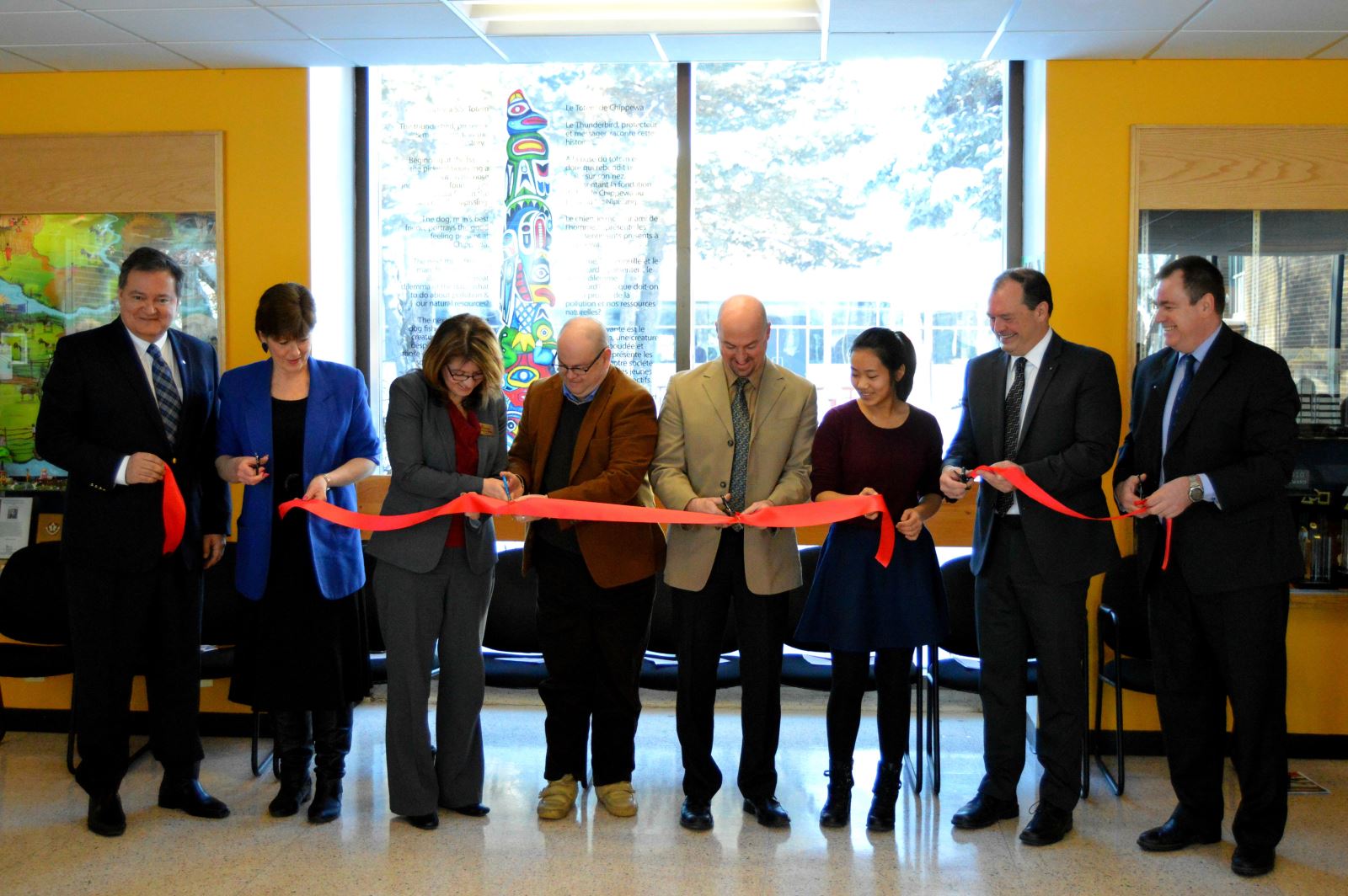 Guest speakers at Chippewa's International Baccalaureate authorization announcement cut the ceremonial ribbon in the school's main foyer on Tuesday morning. Chippewa is the first school in North Bay to offer the distinct Diploma Programme, a process that has been more than two years in the making. PHOTO BY LIAM BERTI
Guest speakers at Chippewa's International Baccalaureate authorization announcement cut the ceremonial ribbon in the school's main foyer on Tuesday morning. Chippewa is the first school in North Bay to offer the distinct Diploma Programme, a process that has been more than two years in the making. PHOTO BY LIAM BERTI
After an intensive two year application process and persistent vision, Chippewa Secondary School has stepped onto the international platform.
The Near North District School Board announced that the high school has officially been authorized as an International Baccalaureate World School at Chippewa on Tuesday morning.
The program is said to prepare students optimally for university and the workforce beyond, with considerations for the students’ intellectual, social, emotional and physical well-being.
As a certified IB World School, Chippewa now joins approximately 2,627 schools in 140 different countries that offer the diploma programme, appropriately naming their offering the ExcelleRAIDER Program.
Of those schools, 337 are in Canada and 154 offer the diploma programme, the closest of which is Lo-Ellen Park Secondary School in Sudbury.
Students aged 16 to 19 will follow a specialized curriculum that deviates from the regular one, with hopes of more appropriately preparing them for post-secondary studies and a global economy.
The primary focus of the curriculum is to promote a strategically balanced education in order to emphasize geographic and cultural mobility, as well as international understanding.
“For us as educators, that’s what make us believe in the program: yes it is enriching as far as the academics go, but it’s the full global-mindedness,” said Chippewa Principal Lucio Pavone.
“Yes the academics are key, but it’s also the other piece where they get a full scope of what’s happening in and around North Bay and the province in general,” he added.
The typical balanced curriculum will consist of courses from the six core subject groups of English, French, math, geography, science, physical education and two electives, such as visual arts, tech and foods, for example.
The students must also learn a minimum of two languages to increase their understanding of different cultures, as well as complete a two-year intensive research study at the end of their studies, all of which is graded by the IB organization.
In ExcelleRAIDER, students will also use pathway planning to reverse-engineer their desired career choice, whether it be nursing, architecture, law, medical science, commerce, engineering, or anything else in between.
David Thompson, chair of the Near North District School Board, said integrating the IB program is a valuable tool for the entire district, not just Chippewa Secondary.
“We are in the business of educating students and future generations, and the Near North District School Board is adding another piece to that, which makes it so attractive for parents to send their kids to our schools,” Thompson said after the announcement.
Thompson said there are currently 88 foreign students enrolled in the NNDSB, with hopes of increasing that number to upwards of 200 in the next few years. He said adding the IB program to the board’s marketing arsenal is a big step in realizing that goal.
“Our recruiter has told us that students, particularly from China, will only go to IB schools, and so our goal is to increase our number of foreign students and they will now be coming to the Near North because of the IB school,” he continued.
But beyond the academics, the announcement is projected to have a big impact for the entire North Bay area in general.
Mayor Al McDonald, Atlas Copco General Manager Geert Van Leemput and Nipissing University President Michael Degagne were all on hand to speak to the importance of the new IB program. All three of the guest speakers said the IB program is international in scope and will hopefully help bridge the gap between local industry needs and the existing talent pool in town.
They said that by preparing students to be able to integrate into the more global economy, such as the local mining sector, will have a long lasting affect on opportunities in town.
The diploma programme was originally created by a group of teachers at the International School of Geneva and was first offered by the International Baccalaureate in 1968.
The organization cite research that shows that the program's students are more capable of demanding workloads and are better suited to higher education. Additionally, many of the world’s leading universities are said to recognize the IB distinction among applications, with some even offering unique scholarships and advanced standing for program graduates.